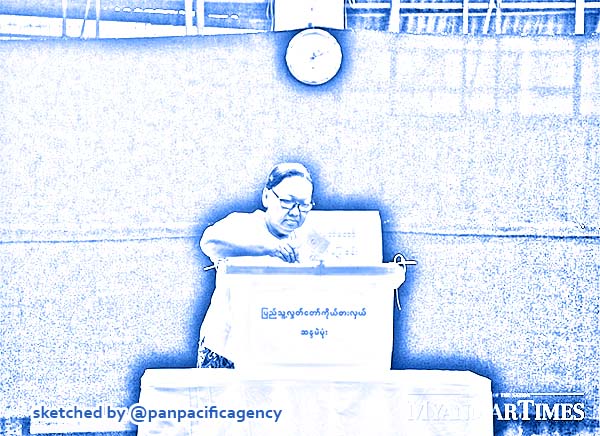[Analytics] Is Myanmar ready for 2020 elections?

A woman casts her ballot during last year’s by-elections in Yangon. Nyan Zay Htet/The Myanmar Times. Sketched by the Pan Pacific Agency.
In late 2020, Myanmar will hold its general election for more than 1,000 seats in its legislative bodies. The lead-up to the elections overlaps with the 21st Century Panglong peace process and the possible repatriating of Rohingya refugees in ways that will only deepen social tensions. Jillian Louis specially for The ASEAN Post.
Myanmar’s history of elections has seen large parties favoured over smaller ones and independent candidates. According to a report by the United States Institute of Peace (USIP), the question of refugee repatriation will likely separate the ruling party from Rakhine ethnonationalists. Women candidates may also be at risk, considering that the percentage of women parliamentarians at the national level increased from six percent in 2010 to 13 percent in 2015, but by-elections in 2017 and 2018 included relatively fewer women candidates.
Populist appeals could undermine Bamar and Rakhine support for the peace process, especially given that social media tends to amplify speculation which then circulates among different groups. Thus, the purpose and intention of the peace process and elections are at odds; on the one hand, there is an aim for conciliation and compromise, while on the other, it drives on competition, victory, and defeat.
Since late 2018, violence between the Arakan Army (AA) and the Tatmadaw (Myanmar military) in Rakhine State have heightened tensions in the fractious region and is likely to continue throughout the lead-up to the elections. The AA is an ethnic Rakhine armed group that has its sights set on autonomy from Myanmar by 2020, as laid out in its sophisticated Arakan Dream 2020, mobilisation campaign.
News coverage of escalating conflict in Myanmar’s western Rakhine state has been blacked out and remains well below the radar of the international community since insurgent violence erupted in early 2019.
Some events have managed to reach the international media – an unprecedented government-imposed internet blackout and a rebel rocket attack on the outskirts of the state capital. When AA-Tatmadaw fighting erupted in Rakhine near the Bangladesh border, hostilities escalated dramatically with several hundred fatalities on both sides. The United Nations (UN) estimates 52,000 internally displaced persons were living in 137 displacement sites as of early February – a tally based on reports from the state government and humanitarian groups.
Safety concerns
Political analysts around the world are questioning whether the conflict between Myanmar’s Tatmadaw, and the Arakan Army (AA) – a well-trained and equipped guerrilla force which enjoys sweeping support and has inflicted serious casualties – is becoming a powerful national threat.
Over decades of civil war, Myanmar’s multiple insurgent groups have avoided carrying their campaigns to major cities. Whether the AA, a new and determined force on the national stage, will be willing to play by the same unwritten rules is yet unclear.
Electoral security is bound to become a major concern for Myanmar’s government in the upcoming elections. Efforts to identify opportunities to mitigate conflict risks in the complex environment – of which the current electoral cycle, Rakhine conflicts, and peace process intersect – is crucial in the lead-up to the 2020 general election in terms of stability.
The Union Election Commission (UEC) has not announced the election date, which is expected to take place in November.
The USIP recommends that parties should recommit and sign a revised code of conduct to not use violence, intimidation, threats, or hate speech in any aspect of the electoral campaigning process. The Myanmar Police Force should also commit to improving the protection of rights, freedoms, and safety of candidates, observers, poll workers, and voters equally.